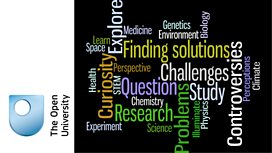Embryos from non egg cells, Gaia galaxy census, Stratolites, Female and male body clocks
How 200 years of received wisdom has been turned on its head as scientists show that its possible to create mice embryos from non- egg cells. With Adam Rutherford.
Scientists have shown for the first time that mice embryos can be made from non egg cells. They've succeeded in creating healthy baby mice by tricking sperm into believing they were fertilising normal eggs. Adam Rutherford talks to lead researcher Tony Perry from Bath University. Might it one day be possible to achieve a similar result in humans using cells that are not from eggs?
The spaceship Gaia launched in 2013 to create the most accurate 3D map of the Milky Way ever. Yesterday, we got back Gaia's first data dump that contains mysteries yet unexplored, and new information on more than a billion stars. Gerry Gilmore from Cambridge University is the mission boss. What has Gaia has been up to in its first 1000 days in space?
Many of us would love to go into space but, almost 60 years after the dawn of the space age, very few can afford it. But there might soon be a cheaper option. ΒιΆΉΤΌΕΔ Future Space Correspondent, Richard Hollingham, reports from Tucson, Arizona, where a balloon company is planning to fly tourists high into the stratosphere and also take on services provided by satellites - such as communications and weather forecasting - with 'stratolites'.
Research suggests that women on average are less alert late at night, and are far more prone to insomnia than men. We're not sure why these differences exist, largely because women are underrepresented in sleep research. Diane Boivin from McGill University in Montreal discusses her new research that has specifically attempted to address this historical shortfall with surprising outcomes.
Producer Adrian Washbourne.
Last on
![]()
This programme is produced in partnership with The Open University.
ΒιΆΉΤΌΕΔ INSIDE SCIENCE RECORDING 22nd SEPTEMBER
Join British ESA astronaut Tim Peake, astrobiologist Zita Martins and physicist, oceanographer and broadcaster Helen Czerski for a recording of a special edition of ΒιΆΉΤΌΕΔ Inside Science, Radio 4βs weekly exploration into how science is evolving, transforming our culture, and affecting our lives.
Science writer and broadcaster Adam Rutherford hosts this expert panel of guests as he asks what is left for us to explore? From encounters in near space and our ability to understand the impact of space travel as we seek to conquer new worlds in our solar system, to detecting signatures of life in the deep cosmos to understanding the least explored ecosystem that we know of βthe deep oceans here on Earth. Itβs a unique insight into how we can conquer human endurance and understand the most challenging and remote environments we know of.
The recording will take place live at New Scientist Live. To find out how you can be in the audience,Β
Broadcasts
- Thu 15 Sep 2016 16:30ΒιΆΉΤΌΕΔ Radio 4
- Thu 15 Sep 2016 21:00ΒιΆΉΤΌΕΔ Radio 4
Explore further with The Open University
ΒιΆΉΤΌΕΔ Inside Science is produced in partnership with The Open University.
Podcast
-
![]()
ΒιΆΉΤΌΕΔ Inside Science
A weekly programme looking at the science that's changing our world.



